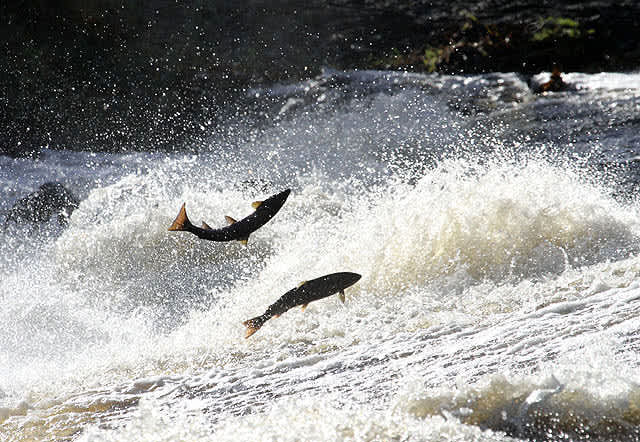Remarkable Progress Made with Michigan’s Platte River State Fish Hatchery Effluents
OutdoorHub 08.29.11

The Platte River State Fish Hatchery’s once problematic phosphorus discharge level is almost negligible now, the Department of Natural Resources and Platte Lake Improvement Association announced today.
Prior to 2000, the salmon-rearing facility was the subject of a lengthy legal dispute involving phosphorus discharges that degraded water quality in Platte Lake. The DNR entered into a consent agreement with the Platte Lake Improvement Association in 2000 restricting phosphorus discharges to no more than 175 pounds annually, a significant decrease from nearly 3,000 pounds in the 1970s, and restricted the number of salmon that could move up to the hatchery.
“We are now below 100 pounds annually, a level that was not considered possible for a hatchery of this size,” said Gary Whelan, the DNR’s fish production manager. “This is the result of a team effort by DNR employees and Platte Lake Improvement Association officials.”
Although the DNR generally met discharge goals from 2000 to 2008, a significant discharge violated the consent agreement. As a result, the DNR paid an $118,000 penalty into the lake improvement association’s rehabilitation fund. With a $90,000 contribution from the rehabilitation fund and an injection of $450,000 in DNR funds, a new chemical-treatment system was installed, a new feeding regime was adopted and the wastewater settling pond was dredged.
“Everyone agreed that the wastewater settling pond dredging was necessary,” said Wilfred Swiecki, president of the Platte Lake Improvement Association. “The remainder of the penalty funds will be expended on additional watershed improvements over the next five years.”
Whelan praised the Platte Lake Improvement Association for its on-going activities.
“We are often amazed by the work of this small group of volunteers,” he said. “After 30 years, they’re still plugging away to improve this watershed. They are involved in every facet that concerns water quality in the watershed from litigation to prevent system degradation to zoning to water quality monitoring to watershed data storage and analysis.“.
Swiecki singled out consent agreement coordinator Raymond Canale for praise, but noted the achievement would not have been possible “without the help, commitment and cooperation of all involved.”
The Michigan Department of Natural Resources is committed to the conservation, protection, management, use and enjoyment of the state’s natural and cultural resources for current and future generations. For more information, go to www.michigan.gov/dnr.

